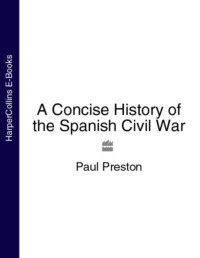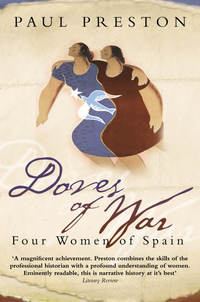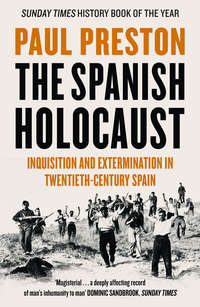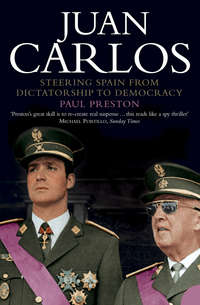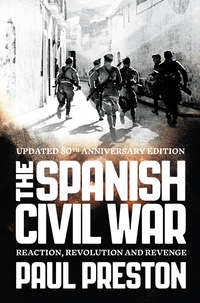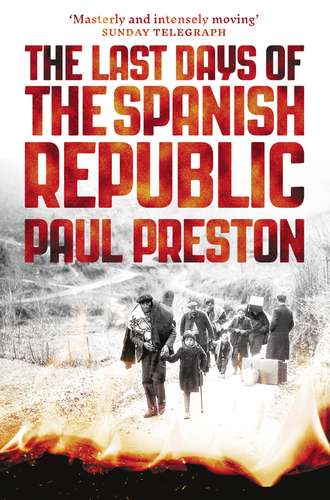
Полная версия
The Last Days of the Spanish Republic
Just before he entered France on 9 February, Negrín had said to the faithful group that accompanied him: ‘Let us hope that we achieve the same success with the second part of the task.’ The ‘first part’ was the evacuation of Catalonia; the ‘second part’ would be the evacuation of the centre-south zone. As Zugazagoitia commented, although Negrín’s public declarations spoke of resistance, ‘nobody knew better than he did how meaningless the slogan was’.33 In this regard, his arrangements to transfer the financial resources of the Republic to France were a crucial part of his plans for evacuation. Rojo’s accusation that no plans had been made was unjust, although it was certainly true that the scale and speed of the final debacle had not been, indeed could hardly have been, anticipated. After the defeat at the Ebro, Negrín had already begun to prepare for the likely Francoist triumph and the need to organize the evacuation, and subsequent support, of many thousands of Republicans. He had instructed the Minister of Finance, Francisco Méndez Aspe, and the most trusted officials of his Ministry, Jerónimo Bugeda, José Prat and Rafael Méndez, to draw up lists of the assets still in the hands of the government. He instructed Méndez Aspe to recover where possible the assets that the Republic had deposited in its offices in Czechoslovakia, the USA, Mexico, France and Britain to pay for arms, munitions, food, medical supplies and raw materials. His task included arranging for goods that had been bought but still not delivered to be converted into cash. Most of the jewels, gold and silver plate, stock and bond holdings of wealthy persons who had left Spain during the war, together with many art works belonging to the Church, had been confiscated by the Caja de Reparaciones and used to buy arms and supplies for the Republic. Since the autumn of 1938, truckloads of the remaining valuables had been brought to Figueras and nearby frontier towns.34
While still in Figueras, Negrín ordered that what remained should be packed and transported to France. He arranged with the French authorities that two sealed trucks laden with 110 boxes of these valuables be permitted to cross the frontier without examination by customs. The trucks went first to the Republican Embassy in Paris and then on to Le Havre where they would be loaded on to a vessel. This was a yacht, originally named Giralda, that had been bought by the Republican government via intermediaries from the former king Alfonso XIII and renamed Vita. In March, with the permission of the French Minister of the Interior Albert Sarrault, the Servicio de Evacuación de los Refugiados Españoles (SERE) was created in Paris, under the protection of the Mexican Embassy and the chairmanship of Pablo Azcárate. The valuables which were intended to constitute its funds were embarked for Mexico on the Vita on or about 10 March. There, in complicated circumstances, they fell into the hands of Indalecio Prieto. The subsequent fate of these funds would be a toxic issue within exile politics.35
Enrique Castro Delgado recounted a meeting with Rojo at this time. Allegedly, Rojo told him that Negrín had ordered him to return to Spain. When Castro asked him if he would go, Rojo replied: ‘No, there are hundreds of thousands of men here needing our help.’ When a shocked Castro asked if there were not also hundreds of thousands inside Spain who needed help, Rojo replied, ‘There’s nothing to be done there … it’s the inevitable death agony that will be followed by the terrible death of an era, the death of a regime, the death of the hope of millions of people.’36 So committed was Rojo to remaining in France that, in his book, he revealed his indignation that Tagüeña, Líster and the chief of his general staff, López Iglesias, the under-secretary of the Ministry of Defence, Colonel Antonio Cordón, the chief of the Republican air force Ignacio Hidalgo de Cisneros and other Communist officers and commissars had returned to Spain without seeking his permission.37
The armies defeated in Catalonia had a strong element of Communists and officers and men who had come through the militias. In contrast, the armies of the centre-south zone had a far higher proportion of career officers, a significant minority of whom were of doubtful loyalty to the Republic. Themselves often under surveillance, they had sought desk jobs behind the lines in training schools and the general staff. They had often provided money, safe-conducts and other documentation and protection for Francoist comrades who had refused to serve the Republic and were in hiding. Franco’s espionage services were especially interested in the beliefs of members of the Republican officer corps in order to ascertain whom among them they could use. As defeat followed defeat, the nostalgia of career officers for the pre-war army provided fertile soil for the recruiters of the Francoist Servicio de Información y Policia Militar (SIPM). These disgruntled professionals had long since felt a certain mistrust of, if not contempt for, the officers who had come through the militias. They harboured the vain hope that there could be a peace settlement arranged with Francoist officers with whom they had been educated in military academies and with whom they had served before 1936. Among the most typical of such officers, and one of the most powerful, was Segismundo Casado.38
Accordingly, such officers in the centre-south zone had no desire to see the return of Líster, Modesto and other Communist commanders who were committed to continuing the fight. These commanders, after doing what they could to improve the conditions of their men, returned to Spain over the next few days. Tagüeña states that he, Líster, Francisco Romero Marín and several other officers from the Army of the Ebro returned on 19 February. There is some confusion over the date of this flight – in two books of memoirs, Líster dated it both five and six days earlier on 13 and 14 February. However, they coincide in lamenting that numerous leading figures of the Communist Party, including Antonio Mije, Francisco Antón, Santiago Álvarez and Santiago Carrillo, did not return on the grounds that the PCE did not want them exposed to danger. Líster recalled that the thirty-three-seat aircraft in which he had travelled had twenty empty seats. Hidalgo de Cisneros told Burnett Bolloten, a United Press correspondent who, by his own account, was a Communist sympathizer at the time, that the last six aircraft that flew from France to Republican Spain were ‘nearly empty’.39 That Negrín had his doubts about those who would or wouldn’t return was reported later by Francisco Romero Marín, who had returned with Hidalgo de Cisneros. When they entered Negrín’s office in the Presidencia building in the Castellana, the Prime Minister exclaimed: ‘Here come another group of lunatics.’40
Cordón met Rojo on 18 February in Perpignan. The new Spanish Consul Rafael Méndez informed them that he had received a cable from Negrín ordering all senior officers and officials of the Ministry of Defence to return to the central zone. A visibly annoyed Rojo said: ‘Well, I will not regard myself as having received that order until the Minister of Defence gives it to me personally.’ Méndez told him to do what he liked and remarked that he thought that soldiers did not need to receive orders to rejoin the army in time of war. Rojo replied that he knew better than anyone where his duty lay and that he was fully occupied in attending to those who were arriving in France and in trying to organize the matériel brought by the army into France. When Méndez replied that there were people doing that already, Rojo walked away without a word. Three days later, Cordón had dinner at the Toulouse railway station with Rojo and Jurado. Equipped with splendid new leather luggage, the two men were on their way to Paris to seek more money at the Embassy for their work with the exiled officers. They had already spent the 4.5 million francs originally given them for this purpose. When Cordón asked if they planned to return to Spain, Rojo again stated that he had not received a direct order to do so and that, in any case, he would go only if he could do something concrete by way of negotiating peace. Cordón reminded them that orders had been issued for their return and that, if they didn’t obey, measures would be taken against them. Jurado replied threateningly that, in such a case, they might make damaging revelations – presumably a reference to the failures of the Republican authorities to prepare for the evacuation and subsequent care of the refugees. Rojo would later make the implausible claim in his book that he had been preparing to return when the Casado coup intervened and made it impossible.41
In fact, Rojo’s absence from Negrín’s side was to contribute substantially to the success of the Casado coup. As Vicente Uribe, wrote in his memoir of the period:
It saw the Government lose a valuable collaborator who would have been immensely useful because of his reputation, and the influence that he wielded over the career officers and the subversives who were already plotting received a major boost from Rojo’s desertion. They knew all about his views and his refusal. Rojo himself had made sure to let them know. In any case, it was evident that he had not accompanied the Government back to Spain. In contrast, the Communist officers had returned to what remained of Republican territory to do their duty.42
Hidalgo de Cisneros stayed on for several days vainly negotiating with the French authorities for his men to fly back to Spain in their own aircraft. At the Paris Embassy, he met both Rojo and Enrique Jurado. Azaña asked for all three to meet him and explain the military situation in the wake of the fall of Catalonia. All three gave bleak reports, of which the most pessimistic was that by Jurado. When Azaña asked them to put their thoughts in writing, Hidalgo suspected that the President was simply looking for a justification for his resignation. After consulting with the Ambassador, Marcelino Pascua, Hidalgo refused, stating that such a report should come from the Minister of Defence, that is to say Negrín. Rojo and Jurado used the same excuse. Azaña was greatly displeased. When Hidalgo returned to Madrid, he recounted this to a furious Negrín, who immediately sent a telegram to Azaña saying that he would hold him responsible for the consequences of behaviour that he regarded as tantamount to treachery. In fact, Rojo had already given Azaña a deeply gloomy oral assessment of the situation which almost certainly reinforced the President’s already firm determination not to return to Spain. Indeed, Azaña would later claim that this was the case.43 Negrín was understandably annoyed and so Rojo wrote a letter to him explaining that he had been virtually ambushed by Azaña during what he had assumed would be merely a formal visit in accordance with protocol. Along with his letter, Rojo enclosed a detailed report on the economic, human and military reasons why continued resistance in the centre-south zone was futile. It seems that he was unaware of the extent to which the rhetoric of resistance was a ploy by Negrín to enhance his diplomacy. Before receiving the letter, Negrín sent, via Marcelino Pascua, a firm instruction to Rojo to make reports to Azaña only via the Minister of Defence, that is to say, Negrín himself. Rojo then wrote another letter reiterating that he had fallen into a trap set by Azaña. The letter also contained a detailed report on the condition of the refugees. Rojo sent copies of these various reports to Matallana, which meant that their gloomy conclusions were known both to other members of Casado’s conspiracy and, of course, to the Francoist SIPM.44
Rojo subsequently claimed that he had stayed on in France because his orders were to remain and do everything possible to ameliorate the situation of the thousands of Republican soldiers now in exile. It is true that he distributed funds to officers for them to buy food, but he also ignored the multiple orders from Negrín to return.45 Rojo declared later that ‘there was no shortage of heavy hints that I should also return’. This was an utterly disingenuous reference to explicit instructions issued by Negrín, not to mention the conversations recounted in their memoirs by Cordón, Tagüeña and Zugazagoitia.46
According to Martínez Barrio, the President of the Cortes, who saw Azaña every day in the Paris Embassy, the text of the telegram sent to the President by Negrín in mid-February was cold, formal and rather threatening. Azaña, who regarded the war as effectively over, had reacted furiously: ‘A fine programme he’s offering me! To enter Madrid, accompanied by Negrín and Uribe, with Pasionaria and Pepe Díaz on the running board of the car.’ (José Díaz was secretary-general of the PCE.) Martínez Barrio pointed out to Azaña that, if he refused to accept Negrín’s insistence that he return to Spain, it was his constitutional duty either to resign as President or else to appoint a new prime minister. Had Azaña resigned then, Martínez Barrio felt that, as his automatic successor, he could have helped Negrín seek a reasonable peace. As it was, Azaña was sunk in lethargy and did not respond. Some days later, Negrín sent another ‘even ruder and more humiliating’ telegram ‘in the name of the Spanish people’ accusing the President of failing in his constitutional duty and demanding his immediate return. Azaña replied on 25 February denying that his absence from Spain had in any way weakened the government or encouraged any of the Great Powers to hasten their recognition of Franco. Before Negrín could reply, Azaña had left the Embassy. He attended a concert at the Opéra Comique with Cipriano Rivas; returning to the Embassy merely to collect their luggage, the two men left together for the Gare de Lyon. Their departure eagerly recorded by an army of journalists and photographers, they took the night train to Collonges-sous-Salève near the Swiss border. As Azaña had done on previous occasions in his political career, he fled from the pressures besetting him, and his flight would be severely damaging to the Republic.47 The Minister of Justice, Ramón González Peña, declared that Azaña’s behaviour was high treason. Negrín even toyed with the unrealistic idea of having Azaña put on trial.48
5
Casado Sows the Wind
Meanwhile, the hostility between the Communists and Casado was becoming ever more public. In fact, Casado had long been attempting to foment dissent between the Communists and the other component groups of the Popular Front. A fruitful opportunity had arisen when the PCE harshly criticized Largo Caballero, who after crossing into France on 29 January 1939 had decided to remain in Paris. As he had abandoned Madrid once before, on 6 November 1936, claims that he had sent his papers and household linen and silver in an ambulance two days before crossing the frontier with his family fuelled accusations of cowardice.1 On 2 February, the PCE issued a manifesto severely censuring his absence at a time when his presence in Madrid might have contributed to raising morale:
The Politburo denounced before the working class and the Spanish people the shameful flight from our national territory of Sr Largo Caballero who, aided by a small group of enemies of the unity of the Spanish people and its organizations, has done everything in his power to sabotage the work of the Government and break the unity and resistance of our people and now crowns his previous criminal activity with this desertion.
In addition to banning the distribution of the manifesto, Casado held a meeting of the Madrid Popular Front at which he deliberately fuelled Socialist hostility towards the Communists by making a theatrical show of stressing his indignation at the way in which Largo Caballero had been depicted. He claimed, falsely, that the manifesto had called the veteran leader ‘a thief and a murderer’.2
With the more realistic and prudent Palmiro Togliatti still in France – after the loss of Catalonia – PCE leaders in Madrid made unrestrained and belligerent declarations about last-ditch resistance. The Comintern adviser present, the Bulgarian Stoyan Minev, alias ‘Boris Stepanov’, was also talking in terms of sidelining Negrín and establishing a revolutionary war council to put an end to capitulationism. Stepanov was doing no more than articulating the party leadership’s visceral resentment of the way they were being blamed for the course of the war. This was made clear in the course of a meeting of the PCE provincial committee held in Madrid between 9 and 11 February. In an unrestrained speech, Dolores Ibárruri attacked Largo Caballero, Casado and Miaja. She referred to the two officers as ‘distinguished mummies’. Vicente Uribe went further, denouncing the cowardice of those who were doing the job of the enemy by spreading the notion that peace without reprisals was possible. His proposal that the Communist Party take power to purge such defeatists and strengthen the war effort was a symptom of impotence, an empty threat designed to inhibit the conspirators. The inevitable effect of its threatening tone was further to isolate the PCE and make Casado readier to act. His initial response was to attempt to censor Mundo Obrero’s report on the the speeches, but his orders were ignored.3
The proceedings of this meeting further intensified Casado’s hostility towards the Communists. He had tried to prevent it taking place, which was a dictatorial abuse of the powers associated with the state of martial law decreed in late January. Deeply irritated by the Communist leadership’s references to the failure of the Brunete offensive and the strong possibility of disloyalty within the military, Casado was all the more furious because Dolores Ibárruri had called him a ‘mummy’. He shouted: ‘I should have no hesitation!… They had better look out! I have foreseen all the consequences. In case anything happens to me, I have a list of all my enemies and at least thirty of them will die!’ Edmundo Domínguez was convinced that Casado’s bluster reflected fear of his machinations being discovered.4
On his return from France on 10 February, Negrín was furious. He viewed the PCE’s calls for an exclusively Communist-led resistance as disloyalty. On the 15th, Líster reported to Negrín in Madrid. The Prime Minister received him in his bathroom where he was shaving. There was nothing unusual in that. On a regular basis, while shaving and or even while soaking in the bath, Negrín would conduct business. He was not bothered by the niceties of protocol and, with so many responsibilities and so little time, he would listen to reports or take advice where he thought it was useful, and one such place was in his bathroom. The American journalist Louis Fischer, who advised him on the foreign press, described how Negrín would invite him to his quarters to talk and he would often find him in the bathroom shaving, clad only in his pyjama bottoms. He would then take a bath while Fischer sat on a stool or leaned against the wall chatting with him: ‘Occasionally a secretary would come in with a telegram, bend over the bath-tub and hold it while Negrín read it. Negrín was very natural and simple about all this.’5
Now, on 15 February, after expressing his appreciation that Líster had returned to the central zone, they talked about the prospects of further resistance. Saying that the pair of them were likely to end up being shot, Negrín gave Líster a gloomy outline of situation. ‘He told me that a whole series of senior military commanders and political and trade union leaders – anarchists, Socialists and Republicans – were ready to capitulate. Wherever they looked, all they saw were difficulties and, instead of working to strengthen the discipline and morale of the troops and of the civilian population, they spent their time spreading defeatism and conspiring.’ Negrín confided in Líster that Rojo had written him a letter presenting his resignation and threatening to make a public statement if he (Negrín) did not put an end to the war and provide more money for the troops exiled in France. Significantly, Negrín added that Rojo had sent a copy of his letter to Matallana. Regarding the situation within the government, Negrín ‘bitterly criticized some of his ministers, saying that they were cowards and did little but squabble among themselves about petty issues. He added that those who continued to behave with dignity were Uribe, José Moix Regàs, the Minister of Labour, and Vayo.’6
The following day, 16 February, according to a report by Togliatti, Negrín spoke on the telephone to Uribe saying, ‘I am told that the Communists in the Popular Front have declared that whether they respect or not the orders of the government depends what the Party decides.’ He said angrily: ‘I will shoot all the Communists.’ According to a similar account of this confrontation given by Stepanov, Negrín rang Uribe and asked him if it was true that the PCE politburo had decided that government measures would be accepted only with its approval. Before Uribe could reply, Negrín said that, if it was true, he would have the entire politburo arrested and put on trial. Shortly after this conversation with Uribe had taken place, Togliatti returned from France and he was able to smooth things over with Negrín.7
During the three and a half weeks that Negrín spent in Spain after his return to the centre-south zone, he seemed to be afflicted with a degree of uncertainty. The man appointed on 24 February to be head of the corps of political commissars, Bibiano Fernández Osorio Tafall, although a member of Azaña’s Left Republican party Izquierda Republicana, was a supporter of the policy of resistance.8 He confided in Cordón his concern that Negrín was wasting time reorganizing government departments instead of creating a general staff of loyal officers. Cordón saw this as the Prime Minister suffering one of his occasional bouts of indecision. Indeed, he concluded that Negrín had returned to Spain ‘not with a sense of being a resolute leader firmly determined to take the reins and steer events, but with the rather heroic attitude of a decent man who accepts a sacrifice, even though he is sure of its futility, in the more or less vague hope that it will not be rendered pointless at the last minute’. In an earlier version of his memoirs, Cordón speculated that Negrín had returned to ease his conscience. Cordón’s concern about what he saw as Negrín’s indecision derived from a conviction that, although the situation was desperate, resistance was still possible and indeed the only way to save thousands of lives.9 After the end of the war, the senior PCE politburo member, the organization secretary Pedro Checa, told Burnett Bolloten (then engaged in writing a pro-Communist history of the Spanish Civil War) that Negrín did not really believe in the possibility of resistance.10 Checa was probably right, but, as Zugazagoitia pointed out, Negrín did believe that a rhetoric of resistance could help bring about a better peace settlement.
A letter from Negrín to Prieto dated 23 June 1939 substantiates the comments of both Ossorio Tafall and Cordón. ‘Once I reached the centre-south zone I endeavoured to raise morale, reorganize services so as to meet the new circumstances, gather the elements necessary for an effective resistance. The measures adopted … would have allowed us to keep fighting until now. Keep fighting, I say, because, even if we could not win, there was no other way to save what we could or at least save our self-respect.’11 This had been confirmed even before that. Álvarez del Vayo had written to Marcelino Pascua on 25 February stressing the importance of giving the British government the sense that the Republic had the capacity for a lengthy resistance in the centre-south zone so that London would put pressure on Franco to agree to no reprisals as the basis of a peace settlement.12 When, after Casado’s coup, Fernando de los Ríos, the Republican Ambassador in Washington, recognized his Consejo Nacional de Defensa as a legitimate authority, Negrín sent him an angry telegram in which he reminded him that the whole point of the rhetoric of resistance was to gain time for a coordinated evacuation and some guarantees against reprisals.13
Prieto’s reply to Negrín’s letter on 3 July quoted a report written after Casado’s 5 March coup by a close collaborator of Besteiro, Trifón Gómez, quartermaster general of the Republican army and president of the Railwaymen’s Union. He supported the coup but had taken little part other than to try to negotiate refuge in Mexico for the Republicans who had to flee. His efforts in Paris to this end were rendered futile by Besteiro’s refusal to allow any government resources to be used to pay for the passage of those who had to flee. Besteiro believed that the national wealth was needed in Spain for post-war reconstruction and that Franco would treat those who stayed behind in Spain all the better for having thus safeguarded resources. That short-sightedness seemed not to diminish the loyalty to Besteiro of Trifón Gómez. Through the visceral anti-communism of his report can be discerned the impotence of Negrín’s government after his return from Catalonia.


